
Table of Content
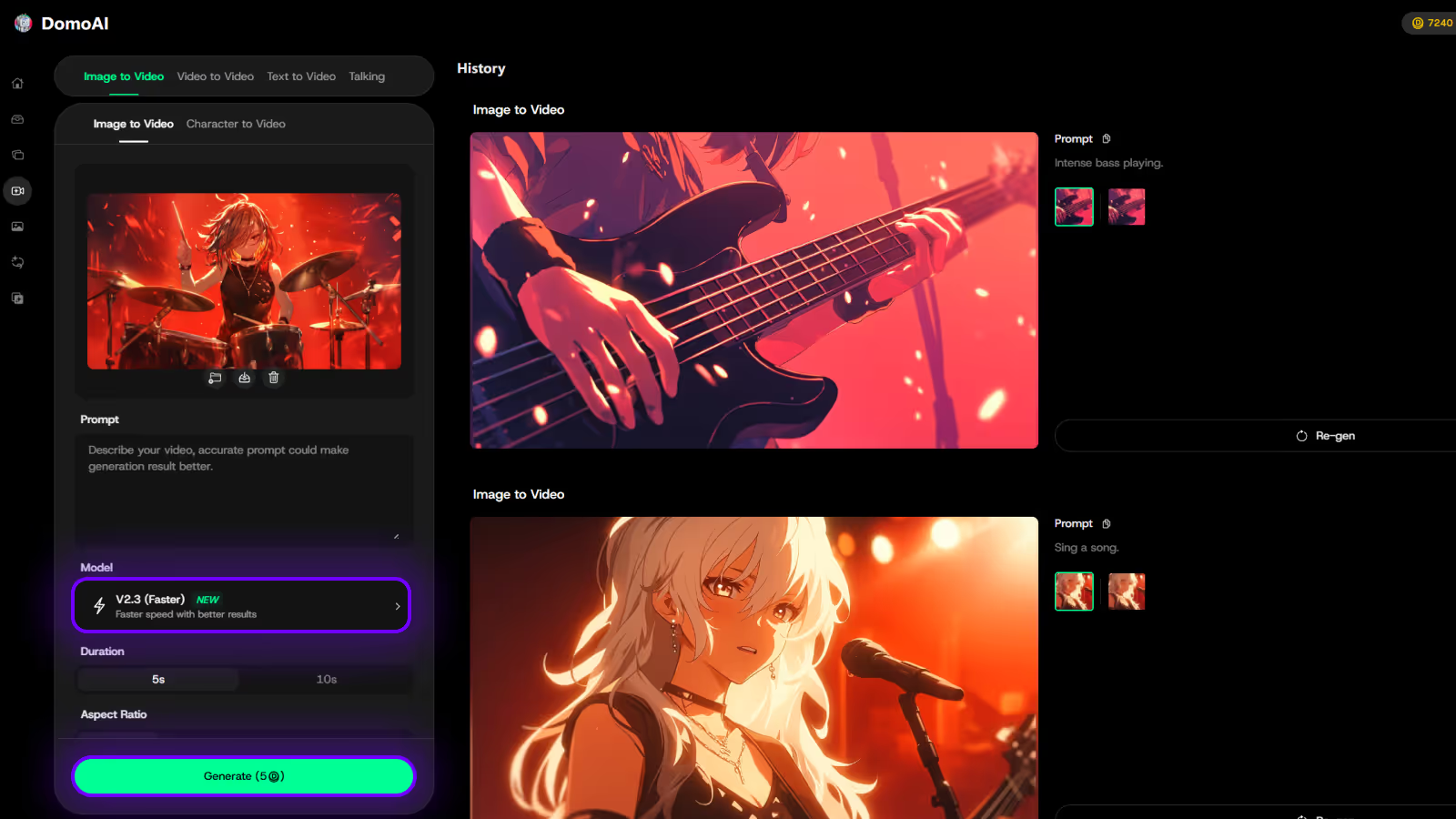
Try DomoAI, the Best AI Animation Generator
Turn any text, image, or video into anime, realistic, or artistic videos. Over 30 unique styles available.
Working with Veo 3 often means juggling tight deadlines, messy footage, and pressure to meet publication deadlines. Many content creators try Vidu AI for AI-driven video creation and automated editing, finding it helpful but not always the right fit for voiceover control, template options, or budget. Which alternatives give you faster video production, better templates, and more precise creative control? This guide points you to the Best Vidu AI Alternatives For AI Video Creation and shows what each tool does best, so you can pick the one that works best for you.
One standout feature is DomoAI’s AI video generator. This cloud-based tool offers simple templates, automatic cuts, and text-to-video features, helping you produce polished videos with a minimal learning curve.
For creators looking for even more flexibility when exploring Vidu AI alternatives, Domo's AI Talking Avatar is highly relevant. Instead of relying solely on generic templates or pre-rendered voiceovers, this tool lets you generate realistic animated avatars that speak your script with natural lip sync and expressive gestures.
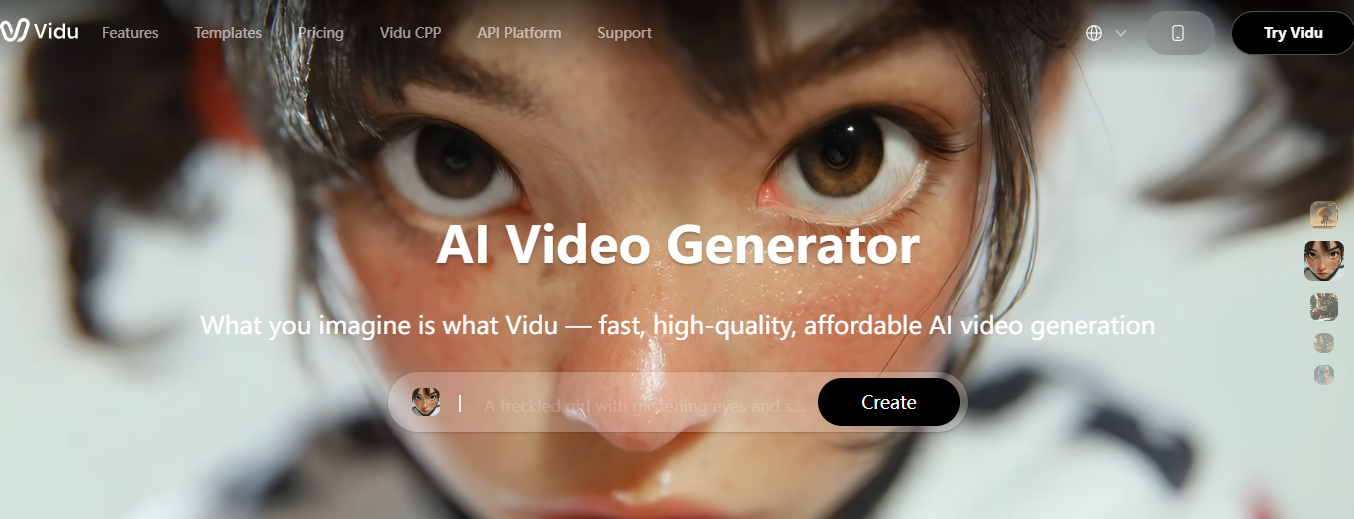
Vidu AI handles small gestures and smooth transitions well, but it falls short in delivering dynamic choreography or complex action sequences. Creators who need character blocking, camera pans, or layered motion often find the motion range to be constrained.
The platform offers limited control over pose timing, movement paths, and scene staging, so scenes that require physical nuance or stunt-like motion often look stiff or simplified.
Need a character sprint, a fight beat, or a multi-actor interaction that reads clearly on screen?
Users report that long or detailed prompts can confuse Vidu AI. The AI sometimes flattens nuance or omits essential story beats, resulting in visuals that deviate from the intended tone or message.
That makes text-to-video workflows hit and miss; you spend time on prompt engineering and iteration without reliable returns. For scripted storytelling or precise brand messaging, inconsistent interpretation becomes costly in terms of time and creative energy.
Do you depend on exact phrasing and repeatable results for your projects?
Vidu caps generated clips at four seconds, which constrains the narrative structure. Short-form mood pieces work, but you cannot build a sequence, pace a story, or craft a multi-shot edit inside the tool.
Stitching separate clips together often requires external editing and can break visual continuity.
You typically need at least 10 to 60 seconds of cohesive footage to capture and hold viewer attention.
Audio tools in Vidu are minimal. You cannot fine-tune music tracks, adjust voiceover timing, or sync sound effects to specific beats within the platform.
That forces creators to export visuals and finish audio in other software, adding steps and losing real-time feedback on how sound and image work together. If you need precise lip sync, beat-matched edits, or layered audio mixing, this gap demands extra tools and time.
Vidu offers entry-level access, but usage beyond simple tests prompts creators to move into higher-cost tiers. Frequent renders, longer projects, or team accounts may result in increased subscription fees and often come with per-clip or credit limits.
For hobbyists testing ideas or studios producing large volumes of content, the pricing model can become a barrier to experimentation and scaling. Are you planning low-volume tests or a sustained production run?
Other AI video generators and AI video maker tools expand motion control, offer longer clip lengths, and include timeline-based editing with audio mixing and voiceover import. Some platforms provide better prompt handling or tools for step-by-step choreography and camera control.
Options also range from lower-cost pay-as-you-go models to open-source tools and enterprise solutions that handle batch rendering, integrate with editing suites, and provide API access for automated workflows. Which of those capabilities would change how you work right now?

Look for true text-to-video generation and AI-assisted scene creation that accepts plain language scripts. Can the platform transform a short prompt into a complete scene, complete with camera moves, character actions, and synced audio?
Expect automatic voiceover generation, lip sync for avatars, object tracking, background removal, and real-time previews, allowing you to see iterations quickly. Check whether the provider supports on-device or cloud model options and will enable you to adjust the model strength for stylization or realism.
You want a rich library of AI video templates and brand templates that speed up production without limiting your creativity. Good options let you set brand colors, fonts, and logo placement once and apply them across projects, edit pacing and transitions precisely, and swap scenes without breaking audio timing.
Look for flexible timeline editing, manual keyframe control when needed, and project variables for batch personalization.
Beyond trimming clips, the platform should generate new footage and produce multi-angle perspectives from minimal source material. Seek features like:
Also evaluate talking avatars, facial animation quality, and how natural dialogue and gestures feel when synced to generated audio.
Prioritise workflow tools that cut repetitive work. Batch rendering, fast cloud exports, automated scene adjustments, and template-driven batch personalization enable high-volume creators to stay productive.
Check collaboration tools such as shared team workspaces, role-based permissions, version history, and an API or SDK for integrating render jobs into your pipeline. Rendering cost and queue times matter, so test export speed and throughput under load.
The final output must meet the platform and social channel requirements. Pick systems that deliver reliable 1080p and 4K exports, proper aspect ratios for stories and feeds, high bitrate and modern codec support, and clean frame interpolation for smooth motion.
Inspect audio quality for automatic noise suppression, balanced levels, and accurate captioning or subtitle export. Verify that metadata, watermarking, and asset ownership align with your distribution and compliance requirements.
Review data handling and intellectual property terms to ensure your footage and scripts remain yours. Prefer providers that offer encryption, private cloud, or on-premises options for sensitive material, clear ownership clauses for generated assets, and responsive support with documentation and demo workflows.
Verify SLAs, uptime expectations, and the process for communicating model updates.
Compare pricing not just on seats but on renders, storage, and API calls. Look for predictable billing, enterprise plans for high volumes, and the option to host models or purchase compute credits.
See whether the platform exposes an API for automation, supports plugins or integrations with DAMs and editing suites, and provides SDKs so you can embed video generation in your products.
Creating cool videos used to mean hours of editing and lots of technical know-how, but DomoAI's AI video editor changes that completely: you can turn photos into moving clips, make videos look like anime, or create talking avatars just by typing what you want.
It’s built so that anyone can create engaging content without needing to learn complex tooling, allowing you to focus on the idea and letting the AI handle the technical work. Create your first video for free with DomoAI today!
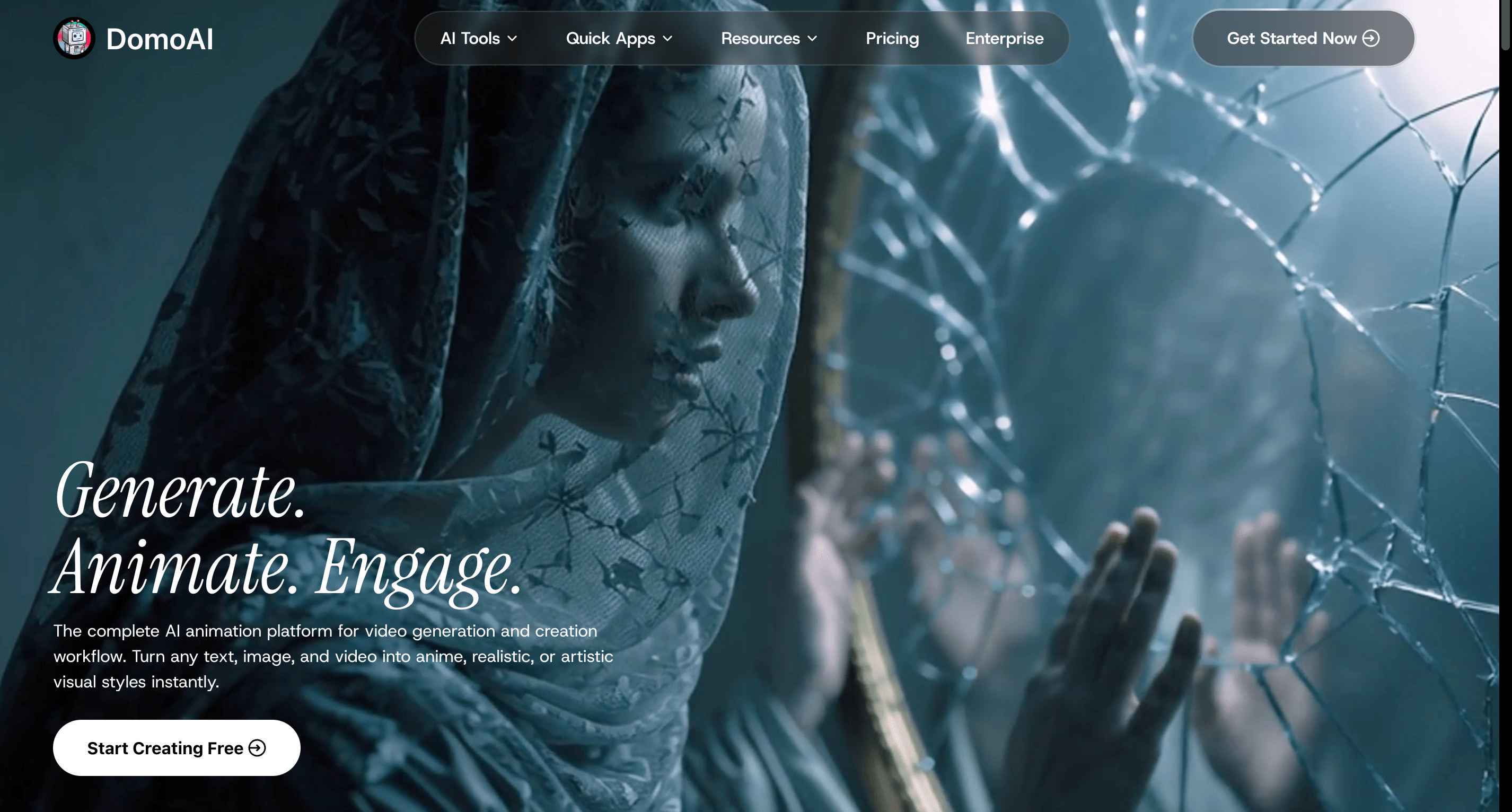
DomoAI converts text, images, and video into anime, realistic, or artistic visuals in seconds. It focuses on style transfer, reference-based motion, and creator-friendly controls, allowing you to move from concept to social-ready clip quickly.
Mentioning Vidu AI alternatives, DomoAI competes as a fuller creative suite rather than only a simple text-to-video editor.
Automated background removal, lip syncing, motion control, and AI upscaling cut manual editing time. Upload dance footage or style references and have the system reproduce motion and visual motifs on your clips.
Creators who want a wide variety of styles, businesses, and influencers producing social content at scale, and animators who need fast character or avatar videos.
DomoAI supports high-volume output and template reuse, making it a practical Vidu AI alternative when you need a consistent look and fast iteration for campaigns or channel growth.
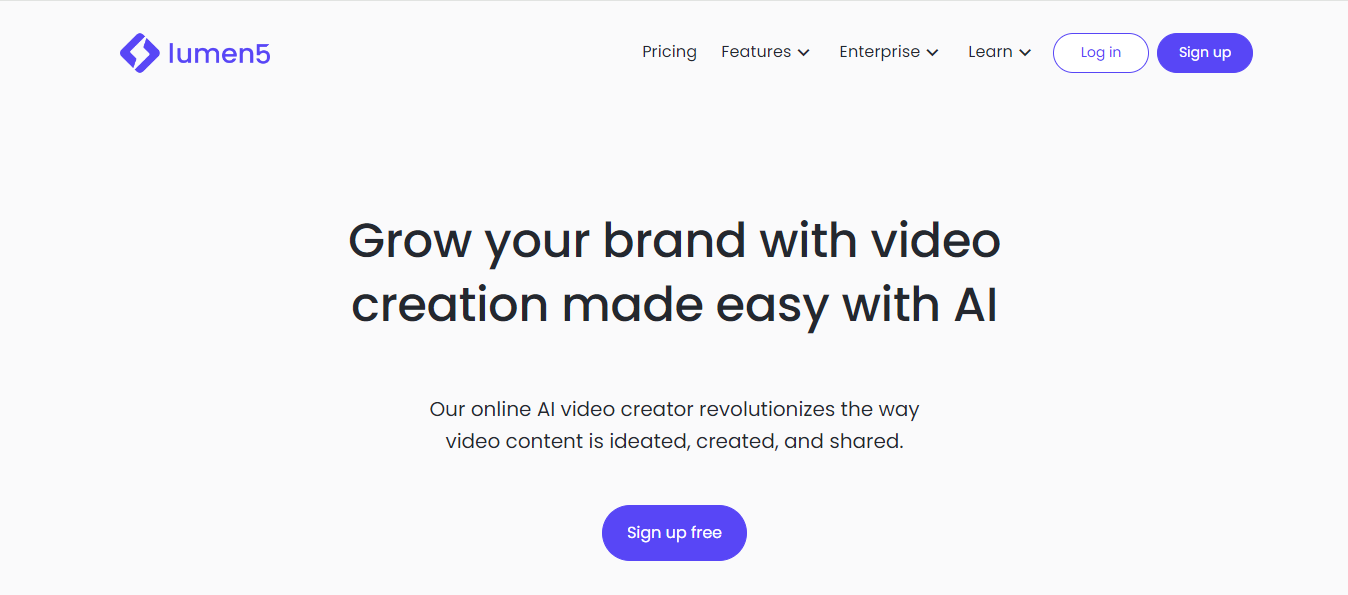
Lumen5 pulls text or a URL and builds a video that highlights key points with imagery and motion. It automates scene selection and matches visual assets to your copy, allowing you to repurpose written content into social clips and promotional videos.
The platform streamlines content repurposing and reduces the hours spent converting posts and reports into video. That helps marketers quickly move archived material into short-form formats.
Use it when you want consistent, templated output from existing long-form assets, especially for distribution across multiple social channels.
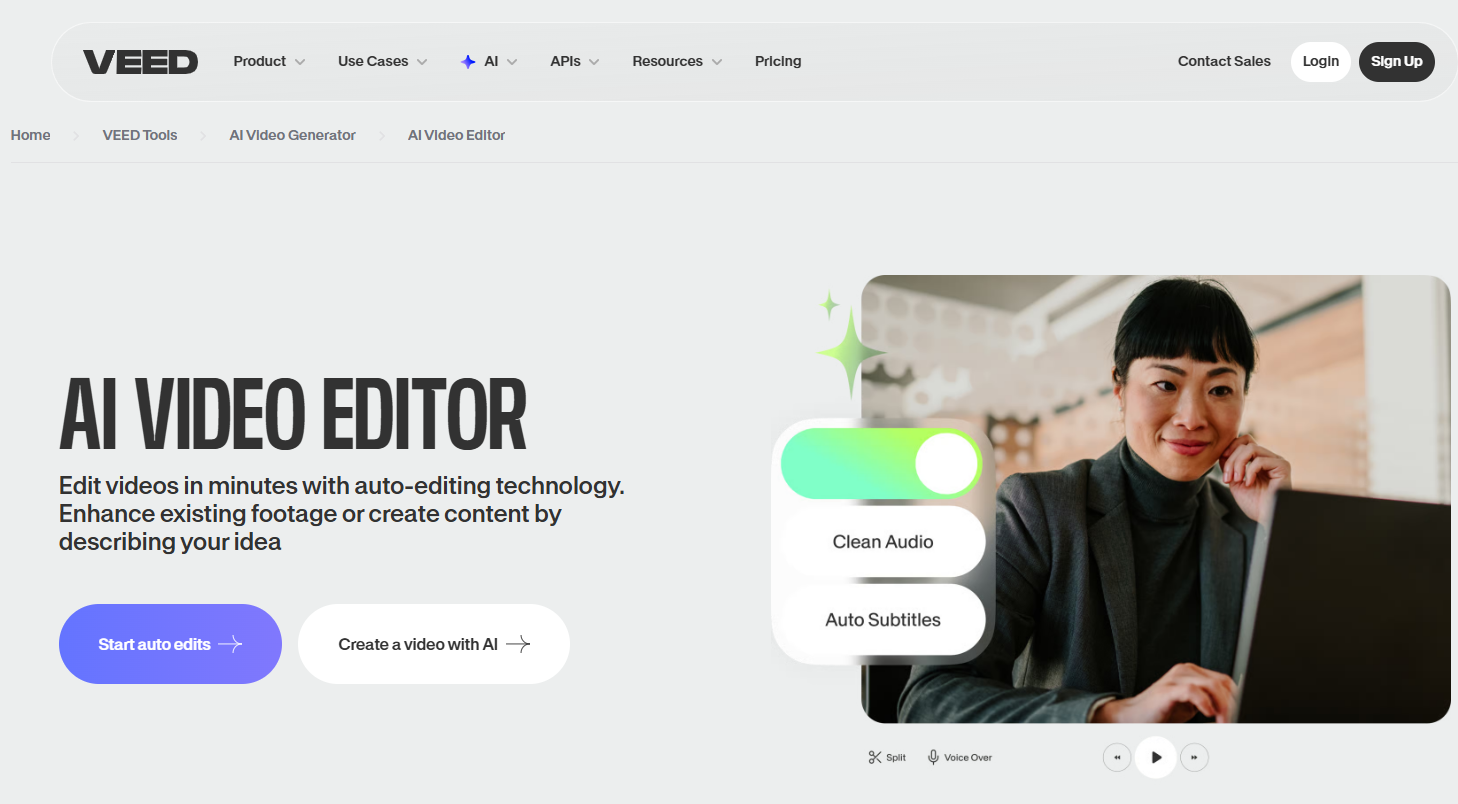
VEED.IO is a beginner-friendly video editing platform powered by advanced AI technology. You can enhance existing footage or even create new content just by describing your idea. Its auto-editing tools handle the technical work—subtitles, audio cleanup, platform optimisation—so you can produce polished, professional videos in minutes, without needing expensive software or prior editing experience.
VEED.IO gives you pro-quality video editing without a production team. Auto Edits instantly improves your footage with clean audio, accurate subtitles, and ready-to-publish formatting. Its AI-powered narration and voice cloning tools also help you create personalised voiceovers in seconds. The platform makes studio-level results accessible to anyone, regardless of skill level.
Use VEED.IO when you want to turn raw footage into clean, engaging video content quickly. Its filler-removal, auto-subtitles, and AI narration tools save hours of manual editing—perfect for creators and teams who want professional results with minimal effort.

InVideo offers a comprehensive suite of templates, stock assets, and editing tools, allowing teams to create promotional videos, social media posts, and tutorials with minimal training. It blends manual control with automated helpers to speed production.
A rich stock library and a robust template ecosystem enable small teams to produce polished content that punches above their weight.
Match templates to channel and aspect ratio early to avoid rework for Instagram Reels, YouTube shorts, or story formats.

FlexClip is an online editor that uses AI to recommend edits, transitions, and styles after you upload footage. It focuses on simplicity and mobile-friendly workflows to keep projects moving.
Automated editing suggestions and thematic styles streamline routine tasks while still allowing for manual tweaks to achieve polish.
Busy professionals and social creators who need clean edits without deep editing knowledge.
Let FlexClip create a first cut from footage, then apply brand elements and text overlays for a quick final touch.
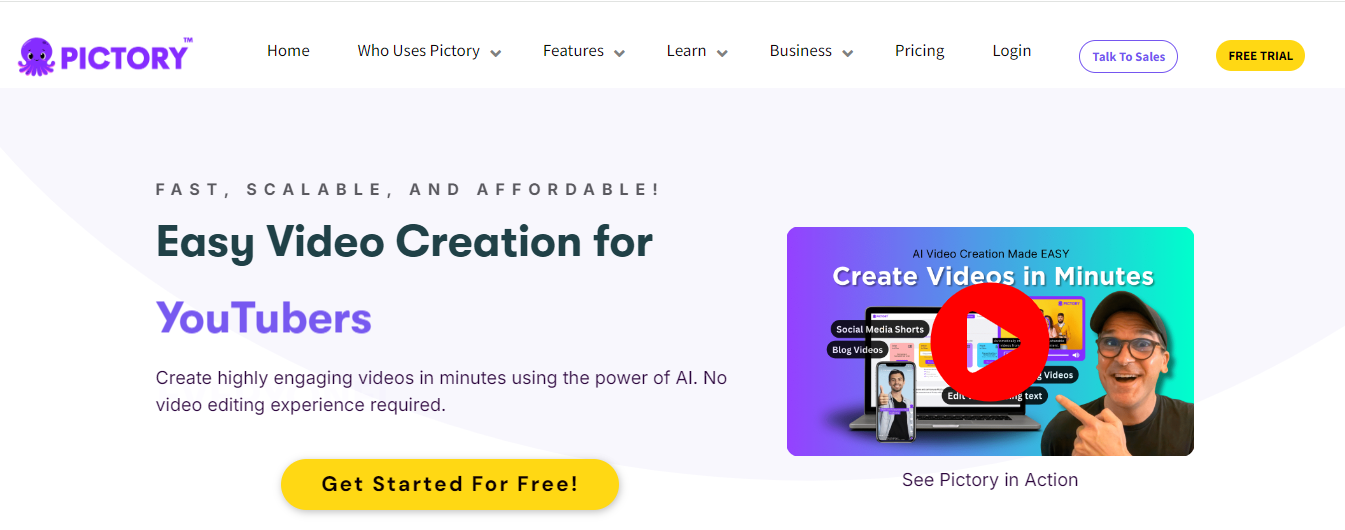
Pictory converts long-form text, transcripts, and podcasts into concise video summaries with captions and visuals. It aids audience retention by highlighting core points in short formats suitable for social distribution.
Automated summary creation and robust text overlay options let creators extract the most shareable moments from webinars, blogs, and episodes.
Use the transcript import to find soundbites and then let Pictory build a share-ready clip with captions for mute autoplay environments.

VideoGen provides AI-powered video generation, editing, screen recording, and live streaming capabilities to support creators and marketers across various content formats.
Combining on-demand video creation with live streaming and social integrations makes it practical for campaigns that mix prerecorded and real-time content.
Social media managers, advertisers, and creators who need seamless sharing and occasional live interaction.
Use VideoGen to centralize production and distribution when your workflow needs both scheduled posts and live audience engagement.

Animaker simplifies animation with drag-and-drop templates, characters, and scenes so non-animators can build explainer videos and ad creatives.
Character-based animation and template-driven assembly reduce production time while preserving creative control over messaging.
Marketers and small studios that need affordable animated spots or social ads without hiring animators.
Create a reusable brand kit in Animaker to maintain consistency in characters, palettes, and fonts across all campaigns.
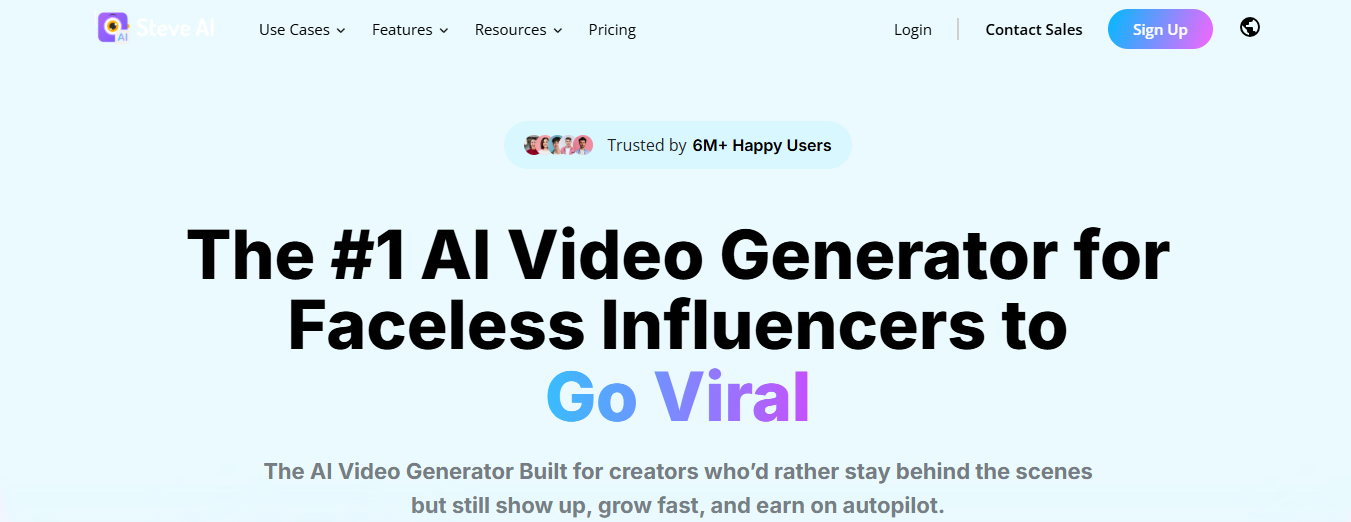
Steve AI transforms text into customized videos featuring lifelike avatars that deliver your message. It focuses on personalization to increase engagement and conversion.
The emphasis on avatar realism and template personalization makes it a good fit for outreach, onboarding, and client communication.
Businesses use video for CRM, personalized marketing, and customer education.
Pair avatar clips with dynamic fields to send tailored messages at scale for higher open and view rates.
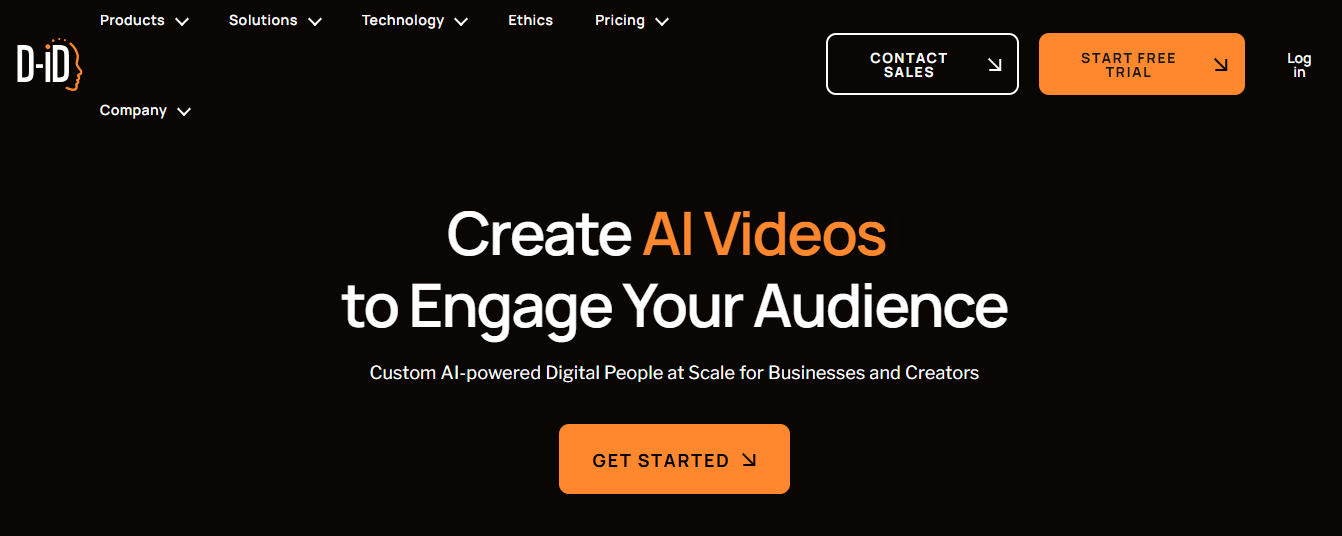
D-ID animates photos into photorealistic talking heads and provides tools for text to speech and facial reenactment. It focuses on privacy and ethical control while enabling compelling synthetic presenters.
Strong facial animation and photo-driven avatar creation let teams build human like presenters from a single image.
Use D-ID when you need a realistic talking head output from static imagery, especially for testimonial-style or guided walkthrough clips.

Heygen produces videos with high-quality digital avatars and natural facial expressions. It adds controls for backdrop and delivery style that enhance viewer connection.
The platform emphasizes realistic expressions and accurate lip syncing to make synthetic presenters feel authentic and approachable.
Use the backdrop and expression controls to match tone to content, from formal training to friendly how-to clips.

Genmo converts text and image inputs into video narratives with automated editing and a set of templates focused on storytelling. It helps marketers and creatives convert posts and briefs into motion content.
Structured narrative outputs and quick template choices speed creative development for campaigns and repurposing.
Digital marketers and content teams are converting written material into short narrative videos for social and ads.
Feed your core message and visual assets, and then iterate on pacing and captions to optimize for platform consumption.
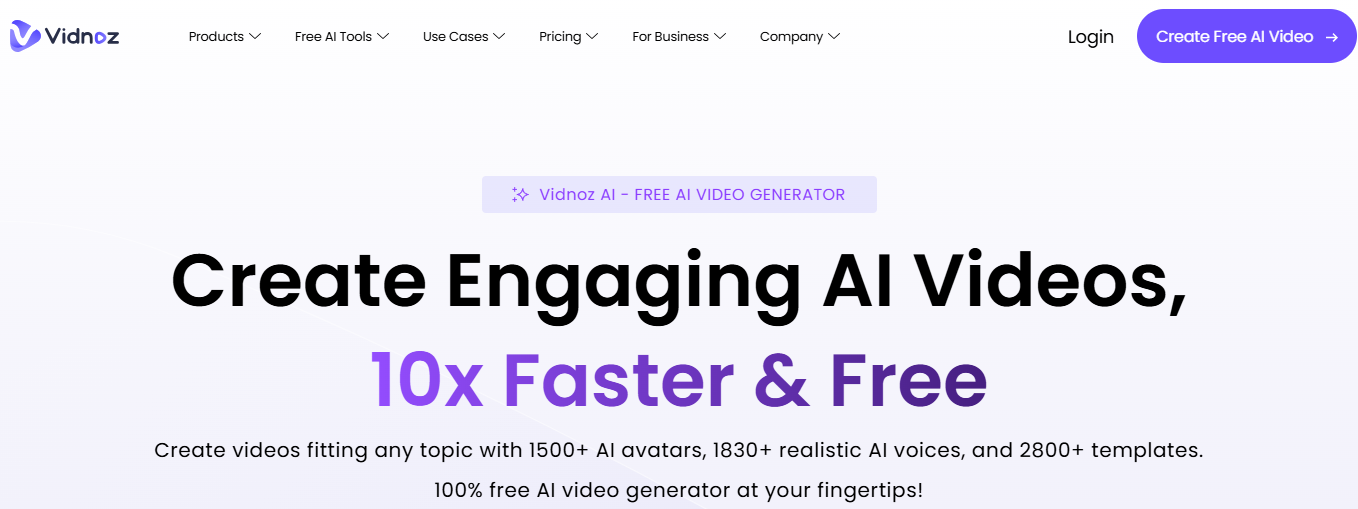
Vidnoz integrates interactive overlays and real-time feedback into edited videos, allowing audiences to click, respond, or engage directly with the content.
Automated embedding of interactive elements transforms passive viewing into two-way engagement, driving measurable actions.
Brands and creators who need interactive product showcases, shoppable videos, or learning modules with checkpoints.
Add hotspots, polls, or branching choices to increase time on content and capture user intent for follow-up outreach.

Consumers are embracing videos, with 80% of online traffic now generated from video views. This trend is fueled by a confluence of factors, including lightning-fast internet, the rise of social media, and a consumer base eager for immersive experiences.
AI solutions can reduce video production time by up to 62%, significantly accelerating the video creation process. It’s no wonder the AI video generator market is on fire. Grand View Research predicts a 19.7% compound annual growth rate, with the market size expected to skyrocket by 2030.
When creating videos using artificial intelligence, following established best practices can significantly enhance engagement rates and viewer retention. AI video tools make professional techniques accessible to anyone, regardless of technical expertise. These guidelines will help ensure your AI-generated content performs well across platforms and audience segments:
Consumers now watch more video than any other format, and roughly 80 percent of online traffic comes from video views. Attention wanes quickly, with the steepest decline occurring within the first few seconds, and engagement drops sharply after the first minute. Start with a clear, urgent hook that tells viewers what they will gain in seconds. Use progressive disclosure: lead with the core message, add key supporting points, then supply extras at the end.
Use rapid but readable scene changes, motion on screen, large readable text, and varied camera framing to hold interest. Test multiple AI-generated thumbnails aimed at improving click-through rates.
Tools such as Vidu AI and other AI video maker platforms can suggest thumbnails, select the highest-performing frames, and create options for A/B testing. Which opening image will get the click for your audience?
Keep most marketing clips under two minutes, break longer content into chapters, and place your strongest visual and verbal cue in the first three seconds. These steps increase the chance that viewers receive your message even if they scroll away early.
AI reduces video production time by up to 62 percent, enabling teams to create more iterations faster. Automated captions enhance accessibility for hearing-impaired viewers and those in silent autoplay environments every day on social media feeds.
Translation and dubbing expand reach; create multilingual versions with the same assets and preserve brand voice with AI voice cloning. AI-driven color grading and shot matching keep visuals consistent across devices.
Dynamic text replacement personalizes on-screen copy to audience segments. Some platforms will analyze engagement data and recommend the best moment to place a call to action.
Use Vidu AI or similar AI video generator technology to automate captions, generate translated versions, apply consistent color grading, and produce cloned voices for consistent narration across videos. Are you ready to scale your content across languages without adding headcount?
Most viewing happens on mobile in noisy, distracting contexts. Design for small screens: use tight framing on the subject, clear and significant text, and a clear visual hierarchy so the message is readable at a glance.
The first three seconds decide whether someone keeps watching or scrolls past, and these seconds must communicate relevance without sound.
Create vertical versions for TikTok and Instagram Stories, square or near square for Facebook feeds, and horizontal for YouTube and LinkedIn. Utilize AI to refine shots, adjust pacing, and swap copy, ensuring each version aligns with platform norms while maintaining brand integrity and core message.
Vidu AI and competing AI video maker tools can automate reframing and create multiple platform-specific edits from a single source clip, saving time and preserving consistency across channels.
Most AI video platforms include analytics that track watch time, drop-off points, retention by second, and conversion events. Use A/B testing to compare thumbnails, open shots, CTAs, and edits. Let data point to the story beats that work, then use quick editing in your AI tool to produce revised cuts.
The AI video generator market is experiencing rapid growth, with a projected compound annual growth rate (CAGR) of approximately 19.7% through 2030. This growth is expected to result in the introduction of additional feature sets and increased automation for testing workflows.
Use the analytics to identify the exact moment viewers stop watching and re-edit or reshuffle content to address that point. Tools like Vidu AI offer built-in analytics and fast editing, allowing teams to run continuous cycles of test, learn, and update without incurring heavy technical overhead.
DomoAI replaces hours of manual work with an automated AI video editor that handles cuts, transitions, color corrections, and pacing adjustments. The platform utilizes image-to-video conversion, auto-edit templates, and scene suggestions to expedite production for social posts, ads, and experiments. Who wants to spend days on timeline tweaks when the AI can match your script to a visual flow in minutes?
Upload images and watch DomoAI animate faces, add motion effects, and create parallax scenes that feel alive. The tool utilizes face animation and motion photo technology, similar to Vidu AI and image-to-video systems, to produce short MP4 clips ready for Instagram Reels and TikTok. Want a behind-the-scenes file for editing or a ready-made vertical clip for social? Which format do you need first?
Apply style transfer to make footage resemble anime, a cinematic film, or graphic art. DomoAI includes filters and style models that translate color grading, line work, and shading into consistent frames across a clip.
You can pick a preset or nudge parameters like detail level and frame blending to match brand or mood. What style will you test on your next post?
Type text, pick a voice, and DomoAI creates a talking avatar that lip-syncs and moves naturally. The platform supports voice cloning, custom voice options, and subtitle generation, allowing creators to deliver messages in multiple languages.
These AI avatars are adequate for tutorials, hosting segments, and persona-driven ads that perform well on social feeds. Do you prefer a natural voice or a stylized character voice?
Creators who focus on content ideas rather than technical editing gain the most. DomoAI suits solo creators, small marketing teams, educators, and social media managers who need quick turnarounds and consistent output.
Use it for short-form content, explainer clips, promos, and prototype videos before moving on to higher-end productions. What kind of content do you make most often?
The system automates storyboard suggestion, auto captions, background removal, and scene transitions while offering manual controls for fine-tuning. Cloud rendering and batch export enable you to produce multiple formats simultaneously for:
You can also access stock assets, royalty-free music, and a template library that mirrors features found in Vidu AI and other video AI suites. Want to try a template that matches your channel format?
Sign up, upload a photo or script, select a template, and the AI generates a draft that you can refine. Create your first video for free with DomoAI today!
After the draft is rendered, you can change scenes, swap voices, add captions, and export an HD file or share it directly to social media. What would you like to publish first?
Recent articles

© 2026 DOMOAI PTE. LTD.
DomoAI
